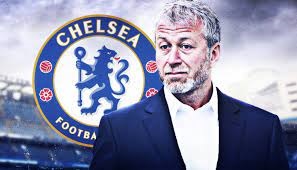The UK government has placed a freeze on Chelsea FC owner, Roman Abramovich’s assets in addition to slamming on him a travel ban.
These are parts of UK’s response to Russia’s invasion of Ukraine.
The Chelsea owner is one of seven oligarchs to be hit with fresh sanctions.
The list also includes billionaires Igor Sechin and Oleg Deripaska, both seen as allies of Vladimir Putin.
Prime Minister Boris Johnson said “there can be no safe havens” for those who have supported the invasion.
“Today’s sanctions are the latest step in the UK’s unwavering support for the Ukrainian people,” Johnson said.
“We will be ruthless in pursuing those who enable the killing of civilians, destruction of hospitals and illegal occupation of sovereign allies.”
There have been clamours for sanction against Abramovich, who said he had made the “difficult decision” to sell Chelsea FC earlier this month.
The football club is among the assets frozen as part of the sanctions against Abramovich and its sale has now been stalled.
The government said it would issue a special licence that allows fixtures to be fulfilled, staff members to be paid and existing ticket holders to attend matches.
However, the club cannot sell any more tickets for games, its merchandise shop will be closed, and it will be unable to buy or sell players on the transfer market.
Abramovich, 55, is alleged to have strong ties to Russian President Vladimir Putin, which he has denied.
The government said Abramovich, who has an estimated net worth of £9.4 billion, was “one of the few oligarchs from the 1990s to maintain prominence under Putin”.
Abramovich has stakes in steel giant Evraz and Norilsk Nickel.
He sold a 73% stake in Russian oil firm Sibneft to state-owned gas titan Gazprom for £9.87 billion in 2005.
Meanwhile, there are reports that Chelsea sale can go through in spite of Abramovich being sanctioned
Roman Abramovich has been sanctioned by the UK Government, plunging Chelsea’s long-term future into doubt.
The Russian-Israeli billionaire’s planned sale of the club will now be stalled, but could still go through provided the Government issues a licence.
Abramovich will have to prove he will not benefit from the sale to meet conditions of any potential licence.
The 55-year-old has pledged to donate all funds from a Chelsea sale into a new foundation to benefit victims of Russia’s war in Ukraine.
And should the Blues owner be able to prove his plans to Government officials, the sale of the Stamford Bridge club could yet go ahead.
Chelsea will be subject to a transfer ban and be blocked from negotiating new contracts with current players, after all of Abramovich’s UK assets were frozen.
Defenders Cesar Azpilicueta, Antonio Rudiger and Andreas Christensen are all out of contract at the end of the season, leaving the senior trio in a state of short-term limbo.
Culture Secretary Nadine Dorries said on Twitter: “Our priority is to hold those who have enabled the Putin regime to account.
“Today’s sanctions obviously have a direct impact on Chelsea and its fans. We have been working hard to ensure the club and the national game are not unnecessarily harmed by these important sanctions.
“To ensure the club can continue to compete and operate we are issuing a special licence that will allow fixtures to be fulfilled, staff to be paid and existing ticket holders to attend matches while, crucially, depriving Abramovich of benefiting from his ownership of the club.
“I know this brings some uncertainty, but the Government will work with the league and clubs to keep football being played while ensuring sanctions hit those intended.
“Football clubs are cultural assets and the bedrock of our communities. We’re committed to protecting them.”
Abramovich has changed the face of British football in his time as Chelsea owner, leading the Blues to 21 trophies in 19 years in a clean sweep of all global competitions.
But that era has been brought to a halt amid Vladimir Putin’s actions and Russia’s war in Ukraine.
Chelsea cannot sell any new tickets to supporters, but all tickets sold before March 10 will be honoured.
Season ticket-holders can still attend matches unaffected, while refreshments can still be served at Stamford Bridge.
The sanctions are club-wide, meaning all Chelsea teams, including Emma Hayes’ highly-successful women’s team, are affected.
Chelsea matches can still be broadcast, while only existing club merchandise can be sold.
British billionaire Nick Candy was the latest high-profile business magnate to throw their hat into the ring for Chelsea’s sale, amid a host of suitors for the Champions League holders.
Swiss tycoon Hansjorg Wyss and American investor Todd Boehly were also in the running, with more than 10 credible parties understood to have been compiling bids.
The Chelsea squad meanwhile continued to prepare for Thursday’s Premier League clash at Norwich as normal.
But everyone at the club was set about examining the details of the current situation.
Chelsea’s shirt sponsor, telecommunications company Three, has placed the deal under review.
A company spokesperson said: “We are in discussions with Chelsea and reviewing our position.”
The three-year deal was announced in January 2020, with the company logos appearing on shirts from the start of last season

























